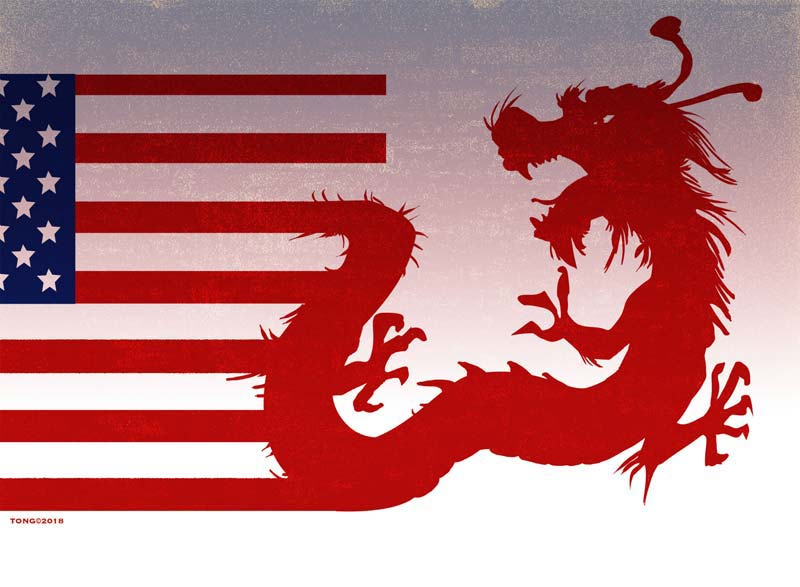
WASHINGTON - Here's a stumper for oddsmakers: What will President Donald Trump agree to first, a deal with Democrats to end the government shutdown or one with the Chinese to cease trade hostilities?
Unlikely as it may seem, the advantage could be shifting in favor of a breakthrough with China. Such an outcome appeared significantly more remote just a month ago, when Trump set a 90-day egg timer for negotiations with Beijing before resuming intensification of the trade standoff.
But as most of Washington fixates on the shutdown stalemate, a possible resolution of the standoff between the world's two biggest economies could be in the works. Chiefly, new shakiness in both economies is adding urgency to two days of face-to-face negotiations between U.S. and Chinese officials that are wrapping up today in Beijing.
Indeed, The Washington Post's Anna Fifield, Gary Shih and David Lynch point to "mounting optimism" for progress on both sides as the talks kicked off Monday. And Chinese Vice Premiere Liu He, President Xi Jinping's economic czar, made an appearance "to spur on negotiators" and signal Chinese seriousness.
Back in Washington, Commerce Secretary Wilbur Ross told CNBC there's a "very good chance that we will get a reasonable settlement that China can live with, that we can live with and that addresses all of the key issues." The Chinese are planning on issuing a detailed readout at the conclusion of the talks amid signs of progress, Bloomberg reports.
Trump tweeted his optimism Tuesday morning: "Talks with China are going very well!" the president wrote.
The Chinese side has made broad offers to meet U.S. demands - to boost purchases of American goods and services, better protect American intellectual property and liberalize access to their markets.
Now, negotiators are attempting to hammer out specifics and enforcement mechanisms, the Wall Street Journal's Lingling Wei reports. "For instance, the U.S. side wants China to be specific about what it will purchase by specific dates. In addition, if Beijing revises regulations to boost U.S. access to China's markets, U.S. negotiators want assurance that it won't use government authority over licensing, environmental regulation and other areas to hinder U.S. companies," Wei writes.
To that end, the Post team reports, China recently released a draft law to bar Chinese officials from interfering with foreign companies' operations. And it has started buying American rice and soybeans again and scrapped punitive tariffs it imposed on U.S. autos last summer. (On the other hand, the FT's George Magnus sees little more than Chinese rhetoric changing where it matters: "Xi is prepared to accede to change but not to anything that threatens China's core interests. He cannot risk caving in to US pressure.")
If the two sides make sufficient progress, Liu could travel to Washington for higher-level talks with U.S. Trade Representative Robert Lighthizer as soon as next week. Trump could take up the matter himself toward the end of the month with Chinese Vice President Wang Qishan, since both are scheduled to be on hand at the World Economic Forum in Davos, per the Post team.
The usual Trump-specific provisos apply: Nothing's done until it's done, and sometimes not even then, as this president has demonstrated time and again that it's his prerogative to change his mind.
But both countries have good reason to hunt for an off-ramp from a confrontation. China's economic growth is on track to slow to a pace not seen there since 1990, and Chinese stocks have lost about a quarter of their value over the past year. New factory price data shows sliding that will eat into industrial profits, in another sign of the country's economic cooling, Bloomberg reports. Trump pointed to the weakness Sunday to argue that Beijing is ready to deal. But the S&P 500 is also down nearly 9 percent since Trump and Xi met for dinner at the G-20 summit early last month.
And trade-related woes continue to roil both U.S. markets and corporate earnings expectations.
White House economist Kevin Hassett acknowledged that fact after Apple sent the broader market reeling last week when it slashed its revenue outlook, citing trouble in China. ""There are a heck of a lot of U.S. companies that have a lot of sales in China that are basically going to be watching their earnings be downgraded . . . until we get a deal with China," Hassett told CNN.
Executives in the industrial Midwest, electorally critical to Trump, are raising alarms about the impact on profits and jobs. And Bank of America economists are warning the advantage the U.S. enjoys from its position of relative economic strength could start to erode by spring.
The ongoing mess in Washington could also spur Trump to action on the China front. As Ben Lavender, an analyst at China Market Research Group in Shanghai noted to the Post team, "Trump would probably like something he can point to as a win, even if it's not substantive, amid the wall and government shutdown chaos."
Every weekday JewishWorldReview.com publishes what many in the media and Washington consider "must-reading". Sign up for the daily JWR update. It's free. Just click here.
(COMMENT, BELOW)


 Contact The Editor
Contact The Editor
 Articles By This Author
Articles By This Author